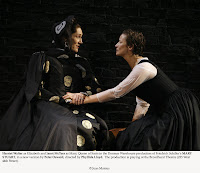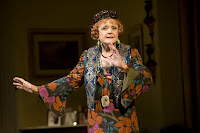
Accounts of the horrors of the Holocaust are numerous, and they need to be told. Less plentiful are the stories of courage in the face of such evil, and these also must be known.
Irena’s Vow, the new play by Dan Gordon, tells one. Tovah Feldshuh powerfully brings to life the true story of Irena Gut Opdyke, a Polish-Catholic woman who hid a dozen Jews in a most unlikely place -- the house of her employer, who just happened to be the highest ranking Nazi officer in Poland. Feldshuh is backed by an outstanding ensemble cast of nine in this inspiring play, directed by Michael Parva, now at the Walter Kerr Theatre.
Irena Gut had been forced to work as head housekeeper for Major Rugemer (Thomas Ryan, left in photo) during Germany’s occupation of Poland. Over a two-year period she risked her life to save 12 Jewish refugees in keeping with a vow she made to herself to do all she could to preserve life. She made that vow after witnessing a Nazi soldier smash a Jewish infant’s skull into the ground and then shoot the mother. Feldshuh tells this story in detail, relating it in the play’s way of presenting her as an older woman talking to high school students about her experiences. As the older Irena, Feldshuh addresses the audience directly; as the younger woman she acts out the scenes. This device works well to move the story along, keeping the show a fast-paced 90 minutes, and covering Irena’s life from age 17 to 72.
Irena’s vow is challenged constantly as she tries to keep her conspiracy secret. It is really tested when one of the refugees, Ida Hallar (Maja Wampuszyc), becomes pregnant and she and her husband, Lazar (Gene Silvers), ask Irena to get them the materials so they can perform an abortion rather than jeopardize everyone’s safety. Irena at first refuses because as a Catholic she opposes abortion, but she relents, fearing it would be impossible for the presence of a crying baby in the basement to go undetected. Ultimately, though, the Hallars decide to have the baby and name him Roman, a name that is a variation of Irena.
Miraculously Irena is able to keep the major from finding out about her activities until one day she slips up after witnessing more Nazi brutality. She forgets to lock the front door of the major’s house during the time she allows the refugees to come out for fresh air. The major returns and discovers them. To buy his silence, Irena agrees to become his mistress.
When the Nazis’ fortunes begin to turn and it becomes clear the Germans will be retreating and the Russians taking over Poland, Irena works with the resistance to smuggle her refugees out of the country. As she spirits them to what she hopes will be safety, she never knows if she will see them again.
Unfortunately, her troubles are far from over. The Soviets jail her for being a Nazi collaborator. They don’t know she saved Jews, all they know is that she was the mistress of a German officer.
But then, in yet another twist in this astonishing story, the Hallar help Irena escape and get to a camp for Jewish survivors. Eventually she makes her way to America to start a new life. A poignant moment in the play is when, many years after her heroic acts, a young man introduces himself as her son. She tells him he is mistaken, that she has only one child, a daughter. He tells her he is Roman Hallar, alive and grown -- thanks to her.
Feldshuh and the other cast members, who also include Sandi Carroll, Tracee Chimo, Steven Hauck, Scott Klavan, Peter Reznikoff and John Stanisci (right in photo), all do an excellent job of portraying the suspense of the situation. I never did, however, get the full feeling of the magnitude of Irena’s efforts because only three refugees are portrayed. I know casting all of them would have been too expensive, but every time Irena mentioned something about 12 people I thought, “Oh, that’s right. There were 12.” I never had a sense of more than the three I saw.
Kevin Judge’s stark, multilevel set is effective, as are David Castaneda’s lighting and Astrid Brucker’s costumes.
Irena’s Vow is a play full of events that seem unlikely, if not impossible. Fortunately for those of us in the audience Thursday night, the amazing stories continued. After taking her bows, Feldshuh introduced Jeannie Opdyke Smith, Irena’s daughter, who with poise and humility answered questions from the audience. Then Smith offered us another surprise, introducing the only other person to call her mother mom -- Roman Hallar.
Smith was asked if her mother, who died at 85 in 2003, had talked to her much about her war years experiences. Her answer was the first of several astounding stories the two shared. In the play, Irena says that when she left Europe after the war she put a “Do Not Disturb” sign on her heart and never spoke of the events again, not until many years later when the hateful rantings and Holocaust denial of a skinhead she heard on TV prompted her personal campaign to speak out. In real life, Smith said, her mother had indeed posted that sign on her heart so that Smith never knew anything about her heroism until a “random” caller phoned one night during dinner when Smith was 14. It was a high school student dialing around to ask people if they thought the Holocaust was a hoax. Opdyke was the one who answered the phone and the question unleashed a lengthy and forceful response in which Opdyke gave her eyewitness account. That’s how Smith learned of her mother’s past, and that was the impetus for Opdyke to begin her outreach to young people. For her efforts, Opdyke is listed next to Oskar Schindler on the wall honoring the Righteous Among Nations in Jerusalem.
When asked if her father knew her mother’s story, Smith shared another extraordinary coincidence. Her mother had told her story to a young American UN worker while she was living in the camp for displaced people just after the war. Years later when she was living in New York she happened to be in a coffee shop near the UN when a young man came up and asked if he could share her table. She said yes and they talked. Then the young man said he knew her, that he had been the one who interviewed her in the camp. They began seeing each other and were married six weeks later.
Smith told of a third remarkable coincidence when asked if her mother had ever seen her family again. Opdyke had found out her parents hadn’t survived the war, but thought it would be impossible to find her four sisters because they surely would have married and changed their names. A young couple heading to Poland offered to search for them for her. Opdyke gave the couple her sisters’ names and they search and searched but could not find them. Just before they were to leave they stopped in a convenience store to buy some goodies for their trip and decided to try one more person. They asked the storeowner, but he didn’t know the women. Then a woman from the back of the store asked to see the list. She pointed to one of the names and said it was hers. Within a week Opdyke received a telegram from all four of her sisters.
Hallar, who is now 64, also had a commanding story to tell. After the war Major Rugemer returned to Germany, but his family wanted nothing to do with him because they knew he had had a mistress in Poland. The town also shunned him so that he ended up penniless and living on the street. The Hallars found out and took him to live with them, and Roman grew up calling this former Nazi grandfather. (The Hallars didn’t know that Irena had resorted to being Rugemer’s mistress to keep him silent.)
Smith attends most performances, but Hallar had just been at the one I attended.
For those of you not fortunate enough to get to New York to see this life-affirming play, the playwright is working on the screen adaptation. As in the original play script, the role of Irena will be played by two actresses, one old and one young. I very much hope Feldshuh will be cast as the older Irena. Much depends, Gordon says, on how compatible she will be in appearance with the younger woman chosen, since that part is being cast first. Scarlett Johansson is said to be a strong contender for the role.
Tickets for
Irena’s Vow are available by visiting Telecharge.com, calling (212) 239-6200 or at the Walter Kerr Theatre box office at 219 West 48th Street. For more information visit www.irenasvow.com.








.jpg)












